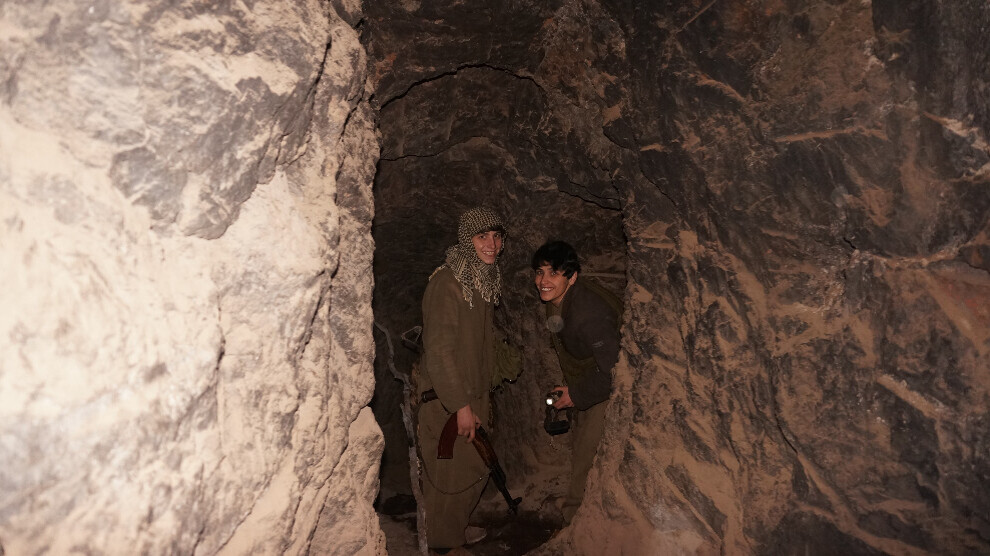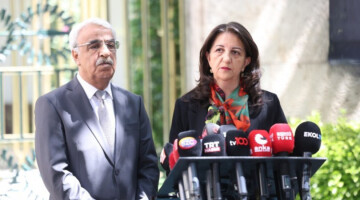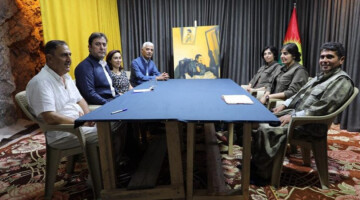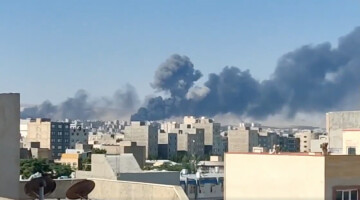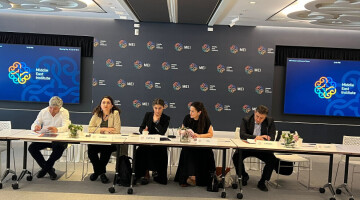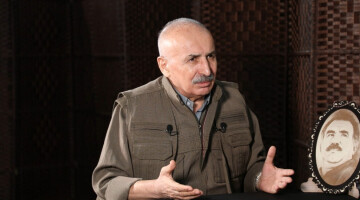The enemy had now seized control of the main gate. They were throwing grenades instead of explosives from the balcony door because they weren't getting anywhere with the explosives from the balcony door. When they arrived at the line of battle, they demanded surrender. The soldiers' goal was to divert the guerrillas with discussion while also throwing and detonating bombs.
Girê Sor was one of the resistance centers in Zap, Metîna, and Avaşîn where the Turkish army launched an invasion attack on April 23-24, 2021. It served as both a spiritual temple and a battleground. The 80-day Girê Sor resistance was assembled from the stories of resistance participants Mizgîn Dalaho, Armanc Sîmko, and Têkoşîn Devrim.
Here is the fourth part of this feature.
WE WON’T SURRENDER
They couldn't get too close since they were using a lot of explosives from their positions. They were also launching missiles. Because the airflow in the location was outward, when they used gas or chemicals in this region, it all returned to them. As a result, they no longer used gas in the locations, which benefited the guerrillas. B7 and grenade launchers were fired toward the top of the general gate, attempting to keep men from working on their positions.
The disadvantage of the positions was that they did not shield each other because they were all next to each other. The cover didn't shield the other doors either, although they weren't upright, so that was a plus. They were also making a lot of calls for surrender during those operations. They talked Kurdish at times, and Baz had even heard some soldiers speak Arabic. The guards were shouting as they came over the hill. They had arrived during Zinarin and Özgür's vigil. They spoke Kurdish, although it sounded close to Adıyaman's Kurdish. The balcony's cliffs were high, and they were shouting from there. Their surrender request was answered like this: "We are Leader Apo's militants, and we will never give up. Surrender is betrayal; we are our people's defenders."
After a while, the enemy opened the Martyr Têkoşîn position, which was previously closed. There were jokes on it: "What is this? We are opening the positions, the enemy is closing them. The enemy is closing the positions, we are opening them".
THEY STARTED TO TURN TOWARDS THE LOWER GATE
After the position gate, the Turkish soldiers planned to attack through the lower gate. We moved away from the main gate and struck the top twice with the B7. The Zagros gun was also used to shoot Cobras through the same entrance. It wanted to arrive at this gate because the enemy's stance at the top was obstructed by it. He wanted to strengthen its position at the top, but it wasn't about to walk through the door. Their distance was too great for explosives or gas to be effective. With ropes, it could only send explosives. Their goal was to rule from afar and prevent the guerrillas from coming here to fight. When the enemy arrived, it was the guerrillas who struck first. That's why they stationed themselves covertly there and planted their snipers. The guerrillas were no longer leaving that location. A woodland area was 150 meters from the gate. The enemy was there. A few days later, it dispatched his snipers to the general gate. When Özgür looked through the general gate with his binoculars, he noticed two camouflaged snipers. It was the 8th of August.
This door was previously used as a DSHK. Botan was urging, "Shoot even if they don't hit." Because he wanted the soldiers to think, "We're higher than them, how can they still shoot bullets?" They weren't supposed to be so carefree. Attack helicopters would reroute after being hit. So, even if there was movement in Mamreşo, they would be shot from here. It was simple to leave here. It was decided that. Because the efforts conducted here were yielding results, the enemy decided to come here. It was decided that If the enemy has returned below, we would take the dock to the middle floor and strike it once more."
It was their first day on the lower ground, and they hadn't yet set their positions. As a result, the guerrillas struck hard that day. It was attempted not to enable them to arrive and dwell happily there. The lower area is now receiving more attention, and the number of sentries has been raised. The enemy would occasionally send explosives down as well as drones. The guerrillas were also shooting shots from here, and they didn't want the enemy to assume they had abandoned this location. They had used ropes to lower the explosive bags to the gate once more. Têkoşîn approached Botan and remarked, "This explosive is too far from the gate; they just put it there so we may be psychologically disturbed. Têkoşîn and Armanc stood guard after Botan went inside. The enemy exploded while they were watching. "We sometimes do irrational things too, if someone hears that we throw a bullet at the bomb, they would think we're crazy," Botan said.
GRENADE SHOTS WITH ESTIMATED ANGLES
A human-like model was created, and a keffiyeh was placed on his head. Turkish soldiers shot it as soon as they got it out of the general gate. When the oncoming bullets struck the stones, stone pieces were occasionally struck. A stone was flung from the bullet they fired and injured Delal in the face one day when she was building a human figure. "Hey, you're wounded too, now you have war scars on your face, now everyone will know you fought too," Botan teased. Delal was then transferred to the third floor, but she constantly said, "I spilt blood downstairs, I have to go there."
On August 11, Mizgîn noticed some bags when she walked out to inspect. They were setting trenches, and if they were let to do so, they would now increase their attack. Mizgîn wanted to go take pictures to figure out what happened because the entire head couldn't be removed. The enemy shot the camera in her hand just as she was about to take it outdoors, and Mizgîn was hurt in her hand. The bullet wounded Têkoşîn's side and grazed his knee when he was inspecting the outside with binoculars. There were minor injuries as well. As a result, they didn't stick their heads out as much, but they were still hitting the enemy with grenade launchers at predictable angles. In fact, it was very desirable for the enemy to attack from the general gate, but they were not coming too close. The front of the door was already a cliff after the enemy planes hit it. If the enemy wanted to enter in, they would have to come right up to the door, but he lacked the guts to do so. It was only a remote control; they stayed in that position until the very end.
THE VENTILATION OF THE TUNNELS WAS EFFICIENT
The tunnels had the advantage of being very well ventilated despite the fact that many doors were closed. It was unaffected by gas. The blasts injured and paralyzed numerous people, yet no one cared. As the number of injured increased, everyone was on high alert for 8 to 12 hours a day. There were exhausted. The number was little in comparison to the size of the cave, but given the supply situation, it was better. There were some difficulties in these areas, but everyone was always coming up with new ways to attack the enemy; and used to go to Botan and make suggestions.
THEY ALL HAD THE SAME HAIR CUT
None of them could meet their particular needs due to the crowding. As a result, the female guerrillas had the most problems, strugglingtheir long hair. The braids were almost longer than their belts. Because there was no way to wash hair, it could no longer be combed as they had been exposed to so many chemicals and gas. The decision was made to cut everyone’s hair. Zinarîn initially refused to do so, but later agreed. There was no one who knew how to cut hair. Zinarîn destroyed everything she touched, like a rookie barber. The remaining victims complained as well. Delal cut Zinarîn and Özgür's hair, leaving them in a total mess. Argêş was called upon out of need. Argêş initially cut the hair of Têkoşîn and Delal, then of all women. Men trimmed their hair to zero, and all of their hair became like men's hairstyles. Everyone had the same appearance. In truth, the consequences of this unjust war that were hitting all of them was also mocked and dismissed. It was attempted not to let any condition that arose in life become an impediment to the effort. Life went on until the martyrdom, having grown accustomed to the atmosphere of this struggle. Aside from the occasional fights and actions, a book was occasionally read. When necessary, organizational items were gathered and prepared for destruction. The camp was packed, and the injured were cared for. Sometimes the stairs were cleaned. Some books were burned so that they would not fall into the hands of the enemy. The days passed like this until the last day.
EXAGGERATION
The enemy has now seized control of the main gate. They were throwing grenades instead of explosives from the upstairs door because they weren't getting anywhere with the explosives from the balcony door. When they arrived at the line of battle, they demanded us to surrender. The soldiers' goal was to divert the guerrillas with discussion while also throwing and detonating bombs. Knowing this, Botan always stated, "Shoot bullets when they talk to you. We realize you're hungry, but there's plenty of food here, and you're already down to five people.” “Can you tell me how many you have?" "We are 50 people," he said. "You are exaggerating" Argêş was told. They were all laughing at Argêş's exaggerated response. Yes, there were now nine people, but their will and determination were sufficient to achieve anything. This frightened the enemy as well. The enemy was standing at the general's door. It was located a long distance away from it. Because there was a lot of earth and stone or something, it was always working hard on the balcony area. Hand grenades landed on the balcony and in front of the barricades at different times. They burst in the Martyr Têkoşîn position as well as on the balcony, and hand grenades or B7 rockets were occasionally tossed down. This hostile disposition and guerrilla struggle lasted until September 3rd.
APPRECIATION OF ORGANISATION
The big device could detect Amed's voice, but the other party couldn't hear it because the wire was only accessible inside. When their speech was heard, there was a burst of morale and strength. The Headquarters' perspectives and assessments of Werxelê and Girê Sor were vastly different. "Are they really saying everything to us?" someone asked while listening to their evaluation. Probably because they were in the middle of a fight, what happened didn't seem that unusual to them. The appreciation of their resistance was high. "Our comrades rate us so highly, how will we be worthy of this?" one person asked. Botan's determination was, in fact, very notable. He was saying: “The organization is dealing with us through the line of Zîlans and Bêrîtans, as well as the dungeon resistance; no matter what, we will not leave the hill. We are satisfied if the organization views us in this way, even if we die or vanish, it wouldn’t be a source of pain."
It was stated that this area would not be abandoned anyway, even if only one person went out to report about the resistance here and communicate what transpired with the organization. That was the sole issue; perhaps it would be worse if the organization didn't know what had happened. Apart from that, everything was in order. They all had that claim in their heads, and it was a one-time thing.
WOMEN'S RESISTANCE AND COURAGE WAS VITAL
The participation of women, their labor, and their participation as in all parts of the resistance that began in Avaşîn, left their mark on the Girê Sor struggle. So much so that the leading male guerrillas gained a lot of strength from it and talked about their labor in this resistance. "We stayed together with female friends over the winter season, sometimes we had problems, criticism emerged. We got to know each other and learned about each other's personalities. When the enemy rose to the top, the female comrades took their seats," Armanc said of the female guerrillas after the resistance effort. The majority of them had prior experience. All of our positions were varied, and especially when it came to attacking the enemy, the women comrades were very brave. We gained courage and morale after witnessing their bravery. For example, when a female comrade took action, when they bravely confronted the enemy, it would encourage us. We had a grenade launcher one day while we were at the mountains, and they had a strategy to shoot the enemy with individual weapons. Zinarîn and I were planning to go. Zinarîn was thrilled and eager. People's morale improved as a result of this. During challenging circumstances, their true nature becomes revealed. In such difficult and hazardous times, whoever is next to you is your true friend. The reality of combat reveals the true nature of solidarity. The women comrades showed no signs of selfishness or disengagement. There was no hesitation. In fact, it is a characteristic of women comrades, and it is a part of Bêrîtan and Zîlan culture. They fought to the last bullet and, if necessary, detonated their own bomb, but they refused to surrender. We were certain that none of them would surrender. I was gaining a lot of morale and bravery. Their engagement, jokes, encouragement, and assistance strengthened our participation and hope.
IT WAS A GREAT OPPORTUNITY
Têkoşîn, for example, carried me to the squad on his back when I was injured. My clothes were already ripped, and I was covered in blood. Heval Zinarîn was the team commander, and she even washed and dressed my socks. This had a huge influence. You’d think that if you went on the battlefield with such companions, you wouldn't mind dying. It's even worth dying as a martyr next to these people. This was a great opportunity. Heval Delal had recently joined us. She spent the first year of their life at Girê Sor. The anniversary of participation occurred 20 days before the operation. Despite her lack of expertise, she was extremely daring. When she shot the first bullet at the enemy, we could see the morale and delight in her eyes. We don't think, even if it is only for their sake, we won’t stop resisting. As a result, it was always women comrades that checked the positions during the vigil. They were usually the ones to thrust themselves forward and say, "Wherever there is risk, we will go." Their participation was in keeping with color and harmony. For example, I was feeling low at times, but they were arguing with me and building morale and strength. There is much to say, yet one cannot convey one's sentiments, therefore one must live...
To be continued...

